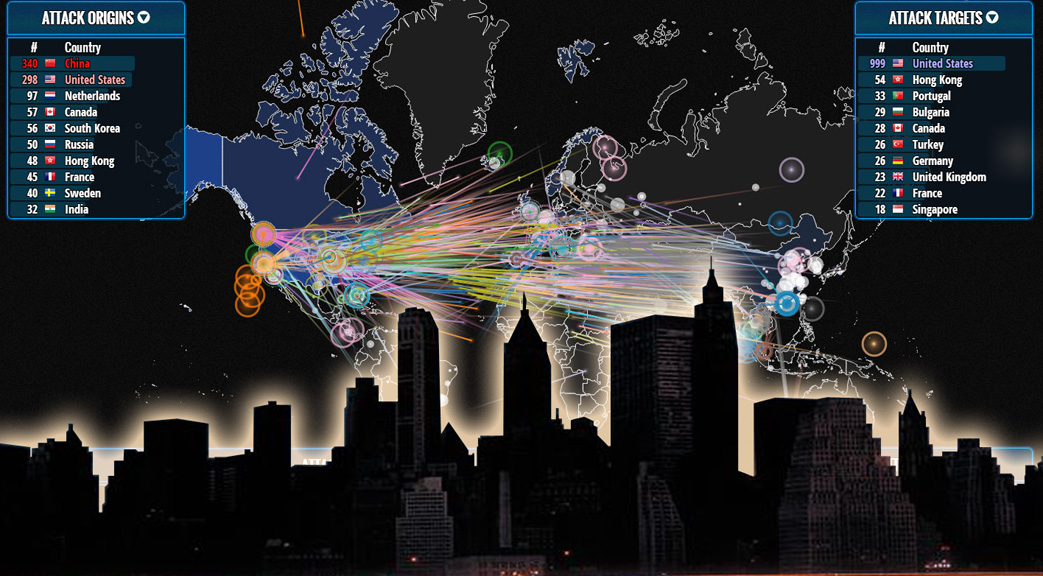Whether you’ve been immersed in the mad circus that is the 2016 Presidential Election or hiding under a rock to avoid it all, you may have missed certain ominous signs recently in the news. These signal a terrifying new reality: cyberwar, international conflict carried out in cyberspace. It’s real, it’s here, and it will inevitably get worse over time. Cyberwarfare is a covert struggle over control of information, and therefore any knowledge of what is going on is a weapon in itself. Thus, cyberwar is surrounded by thorny hedges of secrecy on all sides, guarded by lies and denials from both attackers and victims.
One example comes from Vice President Biden, who recently said darkly that a “message” would be sent to Vladimir Putin in response to Russian hacks. When asked by a reporter if the American people would know when it happened, the veep quipped, “Hope not.” So how can anyone possibly tell what’s going on? Here are a few guidelines:
- Hacks in the last year or so have become far more massive and focused. The Sony hack by North Korea in late 2014 was the first such attack publicly admitted by authorities. Though it damaged and embarrassed the studio, it was a temper-tantrum that was trivial compared to later exploits. The Office of Personnel Management hack of June last year that compromised data on Federal employees, those who had applied for security clearances, and sources, was far worse than generally realized, and so was the lack of an official response. A year later, OPM’s tightened up security, but if any action at all was taken against the likely perpetrator, China (which stridently denied responsibility), it has been entirely in the shadows.
The recent Yahoo data breach which exposed half a billion users’ personal information, however, might have been caused at least in part, by their own sloppiness in spying on emails for the NSA. The spooks themselves are not invulnerable either, as one of their spying toolkits got exposed not long ago, the hackers supposedly wanting to auction off the best exploits.
But the most telling sign is the penetration of the Democratic National Committee, which has been blamed on Russia. As reported in the latest SWCP Portal, this happened just before their convention in a clear attempt to embarrass them (just like the Wikileaks ongoing email dump). Despite Kremilin denials, US intelligence agencies are convinced Putin and pals are behind this to influence or discredit the elections. And the CIA is preparing for a “possible cyber strike against Russia.”. - Disturbing patterns in online attacks and unexplained outages have appeared. Security expert Bruce Schneier recently noted a series of online attacks on companies responsible for critical sections of the internet to probe their defenses. Their sophistication and disciplined assaults that make it appear that some nation-state is learning how to take down the internet.
Other series of disruptions have taken place that have not been commented upon. Airlines, for example, have had power interruptions to their computers, or unexplained glitches and delays — the latest occurring to United Airlines just a few days ago. They have been happening regularly across the board, one a month or so. To an outside observer, this too, looks like some nation is learning how to disrupt air traffic. - The drumbeat for war becomes louder. As another means of conducting conflict, cyberwar does not appear in a vacuum, but is generally due to, and accompanied by, increasing real-world threats. There have been a number of these, and they form yet another source of increasing anxiety. Signs coming out of Russia increasingly signal that the country is readying itself for a real-live shooting war. Not just saber-rattling and loud talking, but quiet actions like large civil defense drills, clarifying command structures, and so on. Most disturbingly, the Kremlin has ordered all relatives of officials abroad to return home now. Perhaps these are all distractions, or signals of the seriousness of the situation, or the setting up of the board for battle.
In any event, the sound of cyberwar happening will likely be a sudden and profound silence. Electrical power will go out, or the web will go down, traffic lights will stop, ATMs will not be responsive – in other words, one or more of the nightmare scenarios of Y2K will finally be realized. But the silence will not last long, and the chaos that results on the ground will likely be just the beginning. A cyber attack might just be a desperate act of defiance by terrorists or other weak enemies, or it could be the first strike in all out war by a powerful nation like, China, Russia, or even Iran. We won’t know until it’s too late.
If the shenanigans of the candidates in this election has not already sent you to your knees, perhaps this might. Not only are the stakes higher than they’ve ever been, the world has entered a dark and dangerous period. And no light has yet appeared to mark the end of the tunnel. Keep your fingers crossed.

